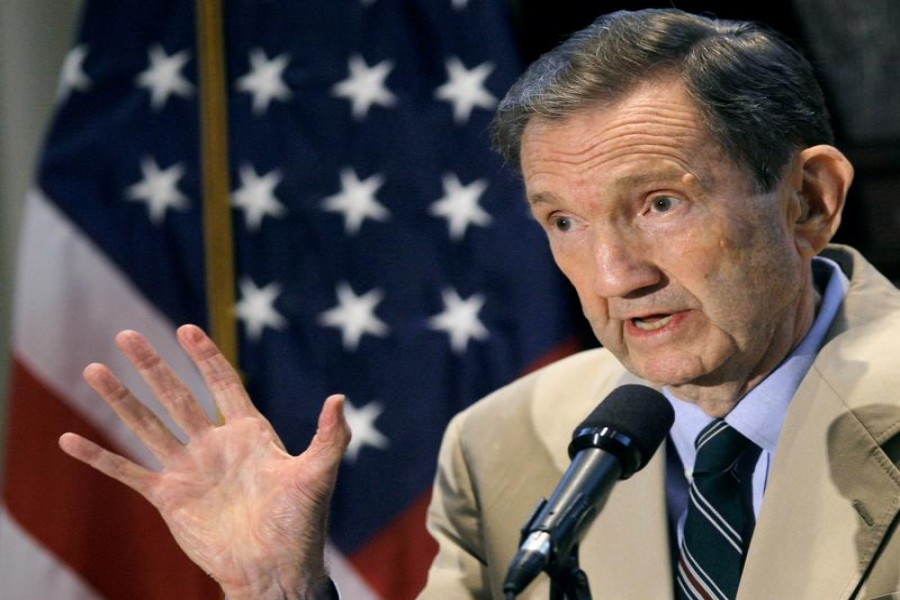Former US Attorney General Ramsey Clark, who helped shape US civil rights law during the Johnson administration but went on to travel the globe to fight human rights abuses by his own country as he saw them, has died at age 93.
Clark, one of the architects of the landmark Voting Rights Act of 1965 and Civil Rights Act of 1968, died on Friday, family member Sharon Welch said, according to media outlets including the New York Times and the Washington Post.
In a lengthy career of representing unpopular causes, Clark defended or gave advice to Libyan leader Colonel Muammar Gaddafi, Yugoslav President Slobodan Milosevic, Liberian political figure Charles Taylor and Iraq’s Saddam Hussein.
Domestically he was active for conservative politician Lyndon LaRouche, Branch Davidian leader David Koresh and antiwar activist the Reverend Philip Berrigan, reports Reuters.
In the 1990s, he helped found the leftist International Action Center in New York, which drew attention in 1999 for street protests condemning the US-led NATO bombing of Yugoslavia.
In an interview with Reuters in July 2001 as he was preparing to give Milosevic legal advice on charges filed by a UN international war crimes tribunal, Clark discussed his commitment to human rights.
“For 30 years I’ve supported the idea and worked for the creation of an international criminal court that has universal jurisdiction and is independent of all political influence and that has the power to prosecute the high and the mighty as well as the weak and the defeated,” Clark said. “Equality is the mother of justice. If there is no equality in law, there is no justice.”
Cuba’s president, Miguel Diaz-Canel, lamented Clark’s death on Twitter on Saturday. “He was an honest and supportive man that stood by our side during crucial battles and denounced the great injustices committed by his country worldwide,” Diaz-Canel wrote. “#Cuba pays him grateful tribute.”
Hanan Ashrawi, a former member of the Palestine Liberation Organization’s Executive Committee, wrote on Twitter that Clark “was an indefatigable defender of Palestinian & human rights, a lawyer who knew & pursued genuine justice & the rights of the oppressed.”
The United Nations recognised Clark’s work in 2008 by naming him one of the winners of its prestigious prize in the field of human rights. Others who have received the prize include former first lady Eleanor Roosevelt and South African leader Nelson Mandela.
Clark was born in Dallas into a prominent Texas family on Dec. 18, 1927. His father, Tom Clark, was named US attorney general by President Harry Truman in 1945 and then to the US Supreme Court in 1949.
Ramsey Clark served in the Marine Corps in 1945-46, making the rank of corporal, attended the University of Texas and the University of Chicago and then practiced law in Dallas.
He joined the Justice Department under Democratic President John Kennedy in 1961 and served in top posts until Democratic President Lyndon Johnson nominated him as attorney general in 1967. His father retired from the Supreme Court to avoid any appearance of a conflict of interest.
In the years after government service, Clark raised eyebrows many times by befriending some of the declared enemies of the United States, including Gaddafi, Saddam and Milosevic.
Clark, in response to a 1986 US military attack on Libya which Washington had accused of terrorism, visited the North African country. At the outbreak of the 1991 Gulf War, Clark defied the US-led coalition to visit Saddam in Baghdad.
He returned to Iraq several times over the years to condemn UN sanctions that were depriving Iraqi children of food and medicine. He joined Saddam’s defense team when the former Iraqi president went on trial for war crimes and even lectured the judge on how to conduct a fair trial.
In the Milosevic case and in the case of a Rwandan militiaman he represented on war crimes charges, Clark argued that the international tribunals established by the United Nations were illegal because there was no provision for them in the UN Charter.
As a top Justice Department official, Clark engaged himself in civil rights. Among his many tasks were surveying Southern school districts desegregating under court order in 1963 and supervising the federal presence at the University of Mississippi following the admission of James Meredith as the school’s first black student.
Clark also helped draft and direct passage of the Voting Rights Act of 1965 and the Civil Rights Act of 1968 containing the first federal open housing law.
In an ironic twist considering his later activist role, Clark as attorney general oversaw the prosecution during the Vietnam War of an antiwar group known as the “Boston Five” for helping draft resisters.
Four of the five, including famed pediatrician Benjamin Spock and Yale chaplain William Sloane Coffin, were convicted.


